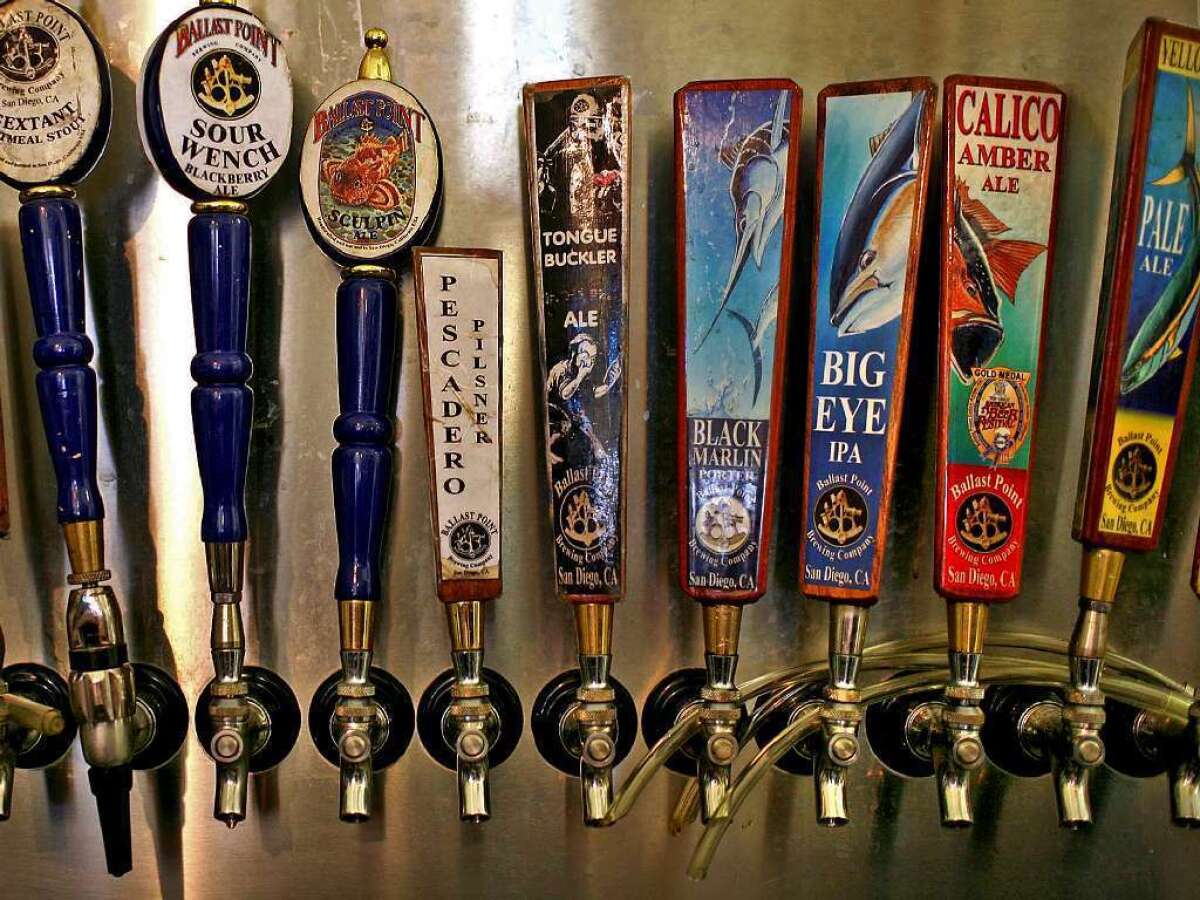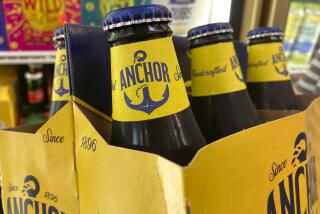How much is a craft brewery worth? How about a billion dollars?

Founded by a group of amateur brewers in 1996, Ballast Point was the 31st largest craft brewer in the country in 2014.
- Share via
Home brewers who simply want to concoct a great-tasting beer for friends and family now have a reason to aim higher. A billion reasons, actually.
San Diego’s Ballast Point, a craft brewery that got its start in the back of a home-brew supply store in 1992, is being bought by alcoholic beverage conglomerate Constellation Brands Inc. The price: $1 billion.
Those aren’t beer goggles you’re wearing. That staggering amount reflects the frothy market for craft brews, which are steadily outpacing growth of the beer industry as a whole as consumers develop a taste for bold and bitter suds.
“It’s hard to digest,” Bart Watson, chief economist for the national Brewers Assn., said about Ballast Point’s price tag. “But it shows where the growth is heading. They’re willing to pay a high price because they believe they will see continued growth and a return on investment.”
And talk about growth: Ballast Point said beer barrel shipments are set to more than double in 2015, from about 123,000 last year. Revenue — nearly $50 million in 2014 — is expected to more than double too.
The spectacular rise puts that $1 billion in better perspective. Based on last year’s sales, Constellation would be paying 20 times Ballast’s revenue, which sounds ridiculous. But 10 times revenue? Not so much. And continued super-growth through 2016 would make the price seem more reasonable still.
See the most-read stories this hour >>
The whole craft beer industry — not just Ballast — is on a tear, even with overall beer growth in the U.S. nearly flat as the Buds, Millers and Coors of the world lose share and fall out of favor. Barrel shipments for craft brewers rose almost 18% last year, with higher rates to come, according to the Brewers Assn.
So the big beer makers are bidding up prices. Heineken bought a 50% stake in Lagunitas Brewing Co. of Petaluma, Calif., MillerCoors acquired San Diego’s Saint Archer Brewing Co., and Anheuser-Busch InBev’s bought Golden Road Brewing of Los Angeles. Based on the Ballast deal, price tags must have been high — though none of the companies will say just how much.
The deal certainly had jaws dropping in San Diego, one of America’s premier beer towns, home also to Stone, Green Flash and other top-notch beer makers.
“The very first guy to walk into my office this morning, the first thing he says to me is, ‘$1 billion. Are you freaking kidding me?’” said Kevin Hopkins, president of the San Diego Brewers Guild and an employee of Vista Mother Earth Brewing.
Even Ballast Point’s chief commercial officer, Earl Kight, admitted surprise when confronted with the size of the deal.
“I can’t believe it either,” he said in a phone interview Monday.
The barrage of craft-beer deals reflects a massive shift toward consolidation in the alcohol industry this year as beer behemoths try to capture market share as overall sales growth stagnates.
That was perhaps the key motivation behind Anheuser-Busch InBev’s agreement last month to buy rival SABMiller in a mega-deal valued at $110 billion.
Craft beer, however, is bucking the trend. Growth is impressive by many measures. Craft’s market share for beer in the U.S. grew to 11% in 2014 from 4.9% in 2010. Retail sales of craft beer in 2014 totaled $19.6 billion, up from $8.8 billion in 2010, according to the Brewers Assn.
“Per capita spending on alcohol is stagnant in the U.S.,” said Nick Petrillo, an analyst for IbisWorld. “Where it’s not stagnant is craft beer. It’s the reason why the industry’s largest macro breweries [are buying craft breweries]. I guarantee going into 2016 it’s something we’ll see more frequently.”
Ballast Point started selling beer commercially in 1996 and has grown into the 31st-largest craft brewer in the country, according to the Brewer’s Assn.
The brand is known for its American India pale ales, which have emerged as the antithesis of the pale, watery lagers that have come to define giants like Budweiser.
Ballast Point produces more than 15 kinds of beer year-round, along with seasonal beers and craft spirits, best known for its Sculpin IPA.
With Constellation, Ballast Point gets a huge infusion of cash for expansion. Recently, the brewer quashed ITS IPO plans after filing papers last month for an initial public offering.
Constellation, which owns brands such as Robert Mondavi Winery and imports Mexican beers such as Corona, Modelo Especial and Pacifico, will give Ballast Point access to a wider distribution network and stronger buying power for ingredients and equipment.
“The IPO was a great option for us,” said Jack White, Ballast Point’s founder. “But we talked to the Constellation folks and we thought this was a better option for us. This allows us to focus on what we do best, rather than be a public company. We can focus on the beer and let them focus on the business.”
Rob Sands, chief executive of Constellation, said Ballast Point has been a key driver of craft beer sales in the U.S.
“Their business philosophy and entrepreneurial spirit perfectly align with our culture, and we look forward to strengthening our position in the high-end beer segment with what is arguably the most premium major brand in the entire craft beer business,” Sands said in a statement.
Based in Victor, N.Y., Constellation holds more than 100 brands in its portfolio and is the third-largest producer and marketer of beer in the U.S. Its strategy has been to accumulate as many brands as possible to overcome lackluster growth in booze consumption, Petrillo of IbisWorld said.
The Ballast Point tie-up with Constellation won’t be the last of the deals in California. The state boasts the nation’s largest number of craft breweries; estimates range from 400 to 600 or more.
Twitter: @dhpierson
Peter Rowe from the San Diego Union-Tribune contributed to this report.
MORE BUSINESS NEWS:
Universal Studios Hollywood raises costs of annual pass
CalPERS may lower investment expectations, costing taxpayers billions
Time Warner Cable customers who bought modems may have to pay rental fee after Charter takeover
More to Read
Inside the business of entertainment
The Wide Shot brings you news, analysis and insights on everything from streaming wars to production — and what it all means for the future.
You may occasionally receive promotional content from the Los Angeles Times.










